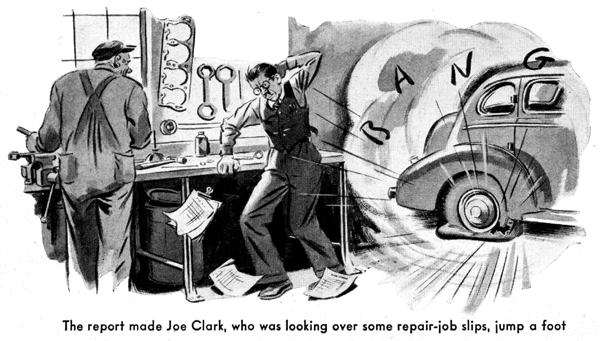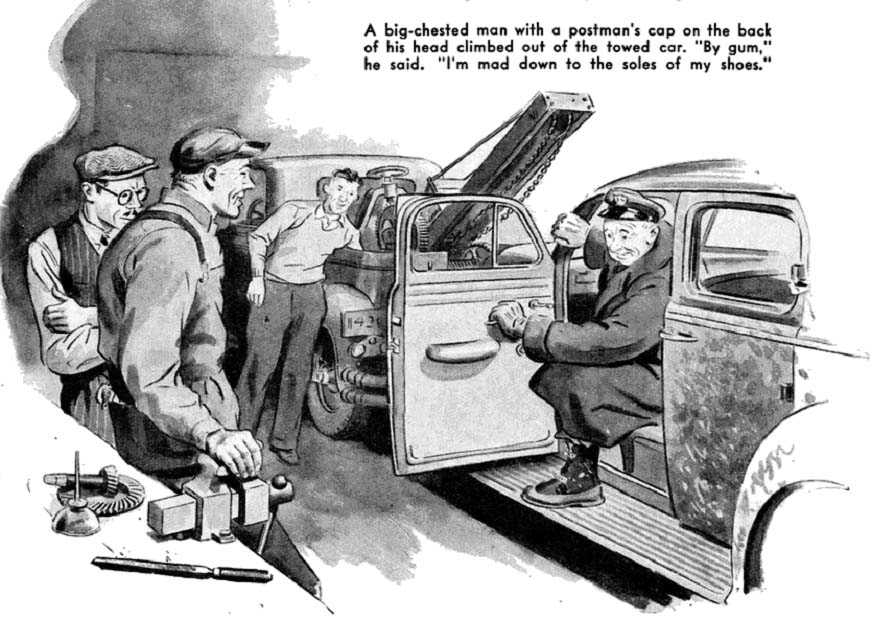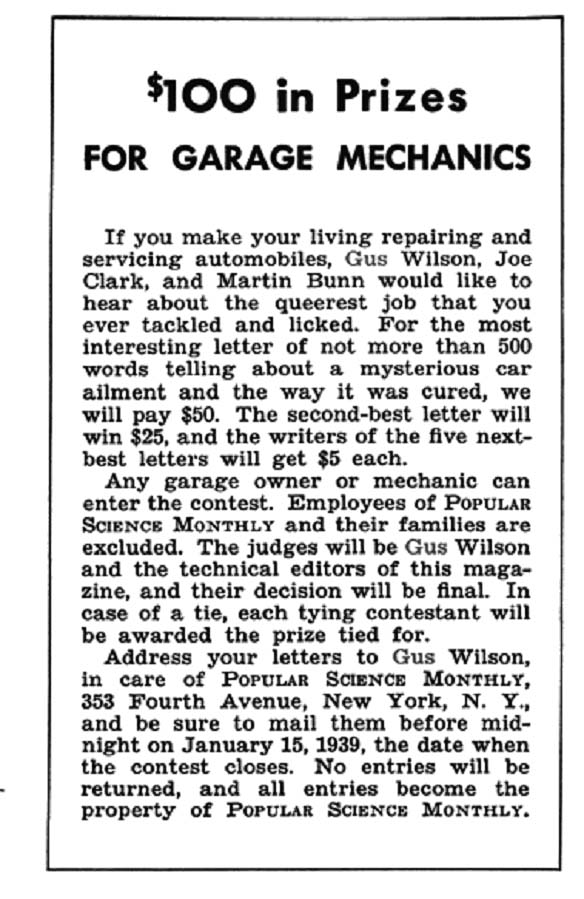January 1939
Gus Solves...
QUEER GAS-LINE TROUBLES
by Martin Bunn

Bang! The sharp report made Joe Clark, who was looking over some repair-job slips at Gus Wilson's workbench, jump a foot.
Gus laughed. "You looked just like a man getting stung by a superpowered wasp," he told his partner in the thriving little Model Garage.
Joe grinned back at him. "Sounded like a blow-out," he said, wiping a clear spot on the misted window pane and peering out into the rain that was coming down in sheets.
"That's funny -- there's not a car in sight. That driver must have gone right ahead on the flat. Well, that means that some one will be selling him a new tire." Suddenly he looked anxious. "Hey, Gus -- that noise sounded as if it was right here in the garage, I wonder -- "
"Now, don't go and get yourself all steamed up," Gus said. "That noise was right here in the garage, and it was a blow-out." He pointed at the right rear wheel of a car that was in for a check-up. Its tire was flatter than a day-before-pay-day bill fold. "There's the baby that made you jump."
"That's a new one on me," Joe said. "First time I ever heard of a tire blowing out while a car was standing in the shop."
"It doesn't happen so very often," Gus admitted. "When it does, it's the result of a bad stone bruise."
"Huh?" Joe asked.
"You're driving along pretty lively -- maybe at fifty-five or sixty an hour," Gus explained. "One of your tires hits a stone. Perhaps you don't even notice it -- and if you do notice it, and get out and take a look at your rubber, everything seems all right. The tread of the tire that hit the stone isn't damaged, and you can't see that the inside layer of its fabric is broken. Well, the inner tube works into the break in the fabric, the unbroken layers of fabric can't sustain the air pressure, and your tire blows -- maybe hours or maybe even a couple of days after the tire got the stone bruise. See?"
"Sure I see," Joe said. "Well, Gus since you're so good at riddles, how about answering this one? While Mrs. Sherman was in buying a new lighter yesterday, she said that her car always runs better -- the engine runs smoother -- at night than it does in the day-time. She wanted to know how come, I didn't know, but I told her I'd ask you about it."
"That's a cinch," Gus assured him. "There are two reasons. One of them is that the air is cooler and heavier at night. That results in a greater weight of air being admitted to the cylinders at each stroke. The greater the weight of air and fuel vapor that is admitted the more power the engine develops.
"The other reason is that at night the air usually has more moisture in it than it has during the day. The increased moisture slows down combustion. Slower combustion results in lessened detonation -- and, so, of course, in increased smoothness of the car's operation."
He waved a monkey wrench menacingly at his partner. "Hey, is this a quiz party?" he demanded. "You ought to have better sense that to get me started talking about gas engines early in the morning. Scram! I've got work to do. Say, where the heck is Harry? That darned grease monkey never is around when -- "
"I sent him out with the wrecker," Joe said. "Ez Zacharias -- you know him, the R.F.D. carrier -- phoned and said he'd have to be towed in. He's got a new car, and he's stalled over on that dirt road back of Mechanicsville."
Half an hour later Harry drove up in the wrecker and towed a shiny new sedan, liberally splashed with mud, into the shop. Ez Zacharias, a big-chested citizen with a weather-darkened face and a postman's cap on the back of his head, climbed out of the towed car.

"By gum!" he said, "I'm mad right down to the soles of my shoes! That old car of mine that I turned in to get this perky contraption had eighty-nine thousand on her, and she creaked in every joint, but I wish I had her back!"
Gus grinned at him. "Maybe you drove that old wreck so long you forgot how to drive a real automobile," he suggested teasingly, "But what's the trouble, Ez?"
Zacharias pursed his lips and let fly a successful testing shot at the waste box under the workbench. Then he bit a fresh half-inch chew off the end of a stick of black plug. "Trouble enough," he said. "There's something all wrong with the gas line on this here job, and I can't for the life of me find out what it is. It's been givin' me the devil and my mail's late, and every one on my route is threatenin' to write to Jim Farley and get me fired. Maybe they think he could get this car runnin'!
"I bought her a month ago. For a couple of weeks she ran like a -- like a dream. Then that wet spell came along. The first day of it, I went over the route easy as slidin' off a log, and I said to myself: 'Ez, you were pretty smart getting' this new car before the real bad weather set in.' And then, by gosh, the very next mornin' she wouldn't start!
"Well, sir, I fooled around and fooled around, tryin' first one thing and then another, and after a while I got around to the carburetor and found that the sediment bowl was just one solid chunk of ice. And the gas pipe wasn't any better! So I thawed 'em out, and drained the gas tank, and filled it up again. I'd bought some gas off a feller out in the country the day before, and I figured he'd been careless and given me plenty of water along with it.
"She ran all right for a week after that. Then we had another rainy day, and a right cold night after it. Next mornin' -- same darned thing! Sediment bowl and gas line froze solid. After I got her goin', I took her over to the feller I'd bought her from. He went all over everything, and looked wise, and told me that I wouldn't have any more trouble.
"And I didn't -- not until this mornin', She started all right until I got over in and ran all right until I over in those hills back of Mechanicsville. Then the motor began to slow down and miss, and I had to give her the choke to keep it runnin'. When I got to Griggs's store I got out and took a look and found the sediment bowl full of muddy water. I cleaned it out, and got goin' again. Quarter of a mile farther along -- same thing all over again. It was pourin' cats and dogs, but I says; "Ez, if there's any one who can find out what's wrong with this danged car, it's Gus Wilson." So I walked to the nearest house with a 'phone and rung you up. Now you fix her!" And Zacharias rang the bell with another long-range shot at the waste box.
Gus grinned. "Thanks for the bouquet, Ez," he said. "Now let's see if I can earn it." He tipped his cap over his left eye as he scratched his head thoughtfully.
"Better take a look at her innards," Ez suggested.
Gus shook his head. "No use in that," he said. "You found water -- or ice -- in the sediment bowl three different times. That proves that somehow water must have got into your gasoline. Well, that happens often enough, one way or another. But you said that it was muddy water. Sure of that, Ez?"
"Sure as death and taxes," Zacharias insisted. "That water was as muddy as the bottom of Mud Lake. And when it was froze, you could see the mud in the ice."
"Well," Gus said, thinking out loud, "there's just one way in which muddy water could get into the gas line -- through the filler pipe." He stooped down, and peered under the rear fender. Then he laughed. "Here it is, Ez," he said, "and it's a brand new one on me!"
Zacharias stooped down and peered under the fender. "See that hose that connects the filler pipe and the gas tank?" Gus asked. "See that clamp that holds it snug on the gas tank?"
"Sure, I see it," said Zacharias.
"But you don't see a clamp holding it snug to the filler pipe do you? There isn't any. But there should be one. It never was put on, or it's jarred loose and fallen off. Either way, the vibration of the filler pipe has spread the upper end of the hose until it looks like a funnel. Driving on those dirt roads in wet weather, your rear wheels threw a lot of mud and water up inside the fender. Some of it ran down the filler pipe, and dripped into that funnel, and then ran into your gas tank. It'll take me five minutes to put on a clamp, and maybe another ten to drain your tank and carburetor. And then you can get back on your job, and keep out of Jim Farley's black books."
Zacharias straightened up with a grunt and scored another plopping bullseye on the waste box. " I'll be darned!" was all he said.
An hour or so later, Joe came into the shop. "Saw old Ez driving away with a grin that stretched from one ear to the other," he said. "Nothing much wrong with his car, I suppose?"
Gus told him about it.
"We get quite a few of those gas-line joins, don't we?" Joe remarked. "None of them amount to much though."
"They don't amount to much from our angle," Gus said, "but they often make a lot of grief for drivers. Most fellows, when their engines don't run right, think of pretty nearly everything else on earth before they think of the gas line. Once I saw a fellow take his engine pretty well apart -- and get everything out of adjustment -- trying to find out why he couldn't get a kick out of it. And what was the trouble? The vent hole in his gas tank had got stopped up! When that happened, of course no air could get into the tank to replace the gasoline that was used, the gasoline flowing out created a vacuum in the tank, and the vacuum finally stopped the flow of gas to the carburetor. He could have located and cured the trouble in ten minutes -- if he had gone about it in the right way."
"What's the right way?" Joe asked.
"A gasoline engine can't run if it doesn't get gas," Gus said. "So whenever an engine won't start, or stops after it has started -- especially if the explosions get weaker and weaker until it stops -- it's only common sense to make certain that the engine is getting gas before you go looking for some other cause of it stopping.
"When an engine won't start, and the battery is strong and the starting motor spins, the gas line should be checked right away!
"First of all, the tank should be examined to make certain that there is gasoline in it. Gauges sometimes get out of order and don't tell the truth. If there is gasoline in the tank, find out whether it is flowing to the carburetor. You can do that by disconnecting the gas pipe from the pump to the carburetor. If that's clean, get some one to watch for you while you step on the starter. If gasoline is reaching the carburetor , it will flow from the pump when you do that. If it isn't, the trouble almost certainly is a clogged fuel line, or vacuum tank, if your car has one, or a busted gas pump.
"Check the fuel line first. See that the vent hole in the gas tank isn't clogged. If it is open, take a careful look at the filter screen -- if there is one -- at the bottom of the tank. It may have become clogged with dirt or sediment. Then check the standpipe through which gasoline is drawn to the vacuum tank. It may be either clogged or cracked. "If the gasoline tank is all right, take off the gasoline pipe and clean it -- either by blowing it out, or by running a wire through it. Check the unions between the gasoline and vacuum tanks. They leak sometimes, too.
"If the gasoline pipe isn't clogged, and it's unions are tight, the trouble most likely is in the vacuum tank.
"Open the drain cock at the bottom of the tank and run a wire through it. If no gasoline comes out there is none in the lower chamber. Check the strainer at the top of the tank. If it isn't clogged, examine the flapper valve in the lower chamber. Sediment may be holding it open.
"As for the gas pump, you've taken plenty of those apart," said Gus, who hadn't even slowed down a pace as he talked and worked at his bench. "One thing to remember always is not to bother to repair anything on it. Take it apart and give it the once over. New parts are cheap, and you can save money for all concerned by simply replacing the parts that are broken or worn out with new ones."
END
L. Osbone 2019
